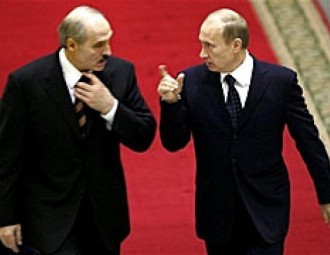Official Minsk counts on cooperation with the West without the need to change political situation

Belarus’ authorities seek to expand cooperation with the EU and the US as well as to get aid from international financial institutions so that to reduce the growing financial dependence on Kremlin.
At a press conference in Minsk, Deputy Foreign Minister Gurianov said that Belarus was ready to discuss political and economic issues with the EU and the United States.
The Belarusan authorities believe they have successfully imposed their conditions in settling Belarusan-European relations and managed to reduce the political component in the dialogue to the minimum. After the Eastern Partnership Summit in Vilnius in November 2013, Belarus’ officials managed to improve their relations with Brussels without making any significant concessions.
The authorities aspire to deepen cooperation with the West on technical and economic issues. As for human rights, democratisation and civil society issues, the Belarusan government plans to confine these issues to vague discussions with Brussels and Washington and make no real steps to change the domestic political climate in the country. Deputy Foreign Minister Gurianov underscored the authorities’ intention to impose pragmatic cooperation with the West: “Fortunately, today there is a certain understanding of what [issues] Belarus is ready to discuss, including political issues our Western counterparts are interested in, and simultaneously develop economic projects which interest business”.
The Belarusan government has already taken several steps towards creating favourable conditions for cooperation with international financial institutions. For example, preparations for negotiations with the IMF about a new loan are underway - in June 2014 National Bank Chairperson Ermakova made a working visit to Vienna, where she met with the head of the Austria’s Central Bank Ewald Nowotny and IMF Executive Director Johan Pradera. Following those meetings, President Lukashenka held a meeting on economic issues with the Security Council and released one of the most significant political prisoners, human rights activist Ales Bialiatski.
In August 2014, the government approved additional structural reforms in the economy "The Plan for Balanced Economic Development in 2014-2015” and in September submitted it to the World Bank for review and recommendations. Economy Minister Snapkou underscored that structural economic reforms had already begun, but they would take some time to come to life: “They will not happen suddenly, i.e. tomorrow, these changes will require some time. Our task is to introduce them neatly, consistently, calmly, without causing any imbalances in the economy or in society."
In addition, President Lukashenka met with the World Bank’s Vice-President for Europe and Central Asia Laura Tuck and requested to expand funding to road construction projects in Belarus. He underscored that “the World Bank is the least politicised financial and economic structure, our cooperation projects and programmes speak in support of this fact”.
Amid the growing geopolitical ambitions of the Kremlin, Minsk hopes that the West will be interested in strengthening Belarus’ economic security through diversification of her public debt. Interestingly, after Belarus repays her debt to the IMF in 2015, the Kremlin will become Belarus’ main creditor. For instance, in 2014 the Russian government approved a USD 1.55 billion loan to Belarus and earlier the USD 10 billion loan for the construction of a nuclear power plant in Astravets.
The Belarusan authorities might increase their contacts with international financial institutions, including the IMF, in order to expand lending to the Belarusan economy in 2015. They might also place additional issues of governmental bonds on foreign markets. However, the authorities are not likely to hold structural economic reforms before the presidential election in 2015.
Based on the article published at Solidarity with Belarus Information Office
-
03.01
-
07.10
-
22.09
-
17.08
-
12.08
-
30.09










































